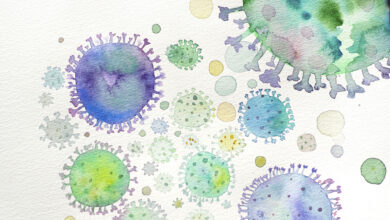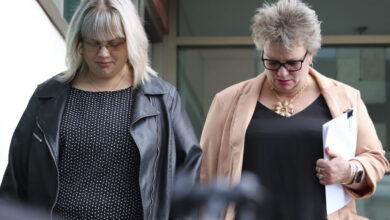By Ameera Steward
National experts and advocates gathered in Birmingham this week to offer insights into addressing the Southern AIDS epidemic.
The event was held Wednesday, Aug. 21 on Southern HIV/AIDS Awareness Day.
The Birmingham-based Southern AIDS Coalition (SAC) convened the professionals to speak about the importance of reducing the spread of HIV/AIDS in the South.
According to the Centers for Disease Control and Prevention, of the new HIV cases in the nation, 52 percent are in the South, which is 36 percent higher than the national average, said Dafina Ward, interim executive director for SAC.
“We cannot shift the dynamic of HIV in this nation until we take a focus and strategic approach to addressing the disparities that are occurring here in the South,” Ward said during a press conference at Red Mountain Theatre. “Here at the Southern AIDS Coalition we’re deeply committed to two things: providing research, advocacy and support for people living with and impacted by HIV in the South, and removing the stigma associated with living with HIV.”
Shirley Selvage, coordinator of health education for UAB 1917 Clinic talked about the need for education so that “we can dispel the myths out there about HIV and how HIV is transmitted.”
“Just this morning I tested over 20 folks in our community for HIV and provided education,” she said. “It’s 2019 and folks are still uneducated about HIV. Individuals still think that HIV is a gay disease, but I say anybody whoever had unprotected sex can be exposed to HIV.”
The experts also highlighted the importance of addressing issues such as public policy, housing practices and discrimination, substance use, intersectional advocacy, and medical intervention to reduce the spread of HIV/AIDS.
“We must all work collaboratively towards addressing the needs of folks who are living with HIV in our region,” Ward said. “We must end stigma and discrimination…myths and lies so that we can address what’s happening in our communities. We must address systemic barriers…all of the isms, [and] the phobias that exists and that are part of the barriers that are resulting in the disproportionate impact of HIV and AIDS in the [South].”
Housing
Addressing the epidemic “starts at home,” said Rusty Bennett, executive director of the National AIDS Housing Coalition.
“When we think about being in the South and we understand the importance that home has for each one of us – how it represents our family, gives us opportunity – and at the National AIDS Housing Coalition we recognize that throughout this country, here in Alabama, across the South, we are facing a housing crisis,” he said.
To end the epidemic, stable, decent and affordable housing are critical, Bennett said because “once people are stabilized in housing, we see positive health outcomes, people thriving in their lives because of it.”
“And it’s only by addressing this housing crisis will we see an end to this HIV epidemic. We need additional resources to make sure that we’re prioritizing this as a critical intervention,” he said.
Quentin Bell, executive director of the Knights and Orchids Society, said the trans community faces a barrier finding “people who really see us as human beings and who want to provide us the same level of care they provide to other clients.”
There are also few leadership opportunities particularly in Alabama “where trans people can actually rise to the top and be able to build skills and develop to be able to empower our community ourselves and advocate for ourselves,” Bell said.
Carmarion Anderson, national co-facilitator of TransFaith of the Fellowship of Affirming Ministries, said, “as a trans woman, I understand the disparity that we go through on a day-to day basis…the data will show…that we are now the new cases of HIV because we’re being overlooked.”
Anderson added that the trans community also needs “equitable access to healthcare . . . equitable access to health benefits, and equitable access to jobs, equitable access to transportation – things that are going to allow us to thrive.”
Bipartisan Support
Aquarius Gilmer, SAC’s director of government affairs and advocacy, said Southern HIV/AIDS Awareness Day was bipartisan support and pointed out the President Donald Trump announced that he has a 10-year plan to end HIV domestically.
“We think that it’s not only bold and honorable, but we also think it’s possible,” Gilmer said. “And so today we are sitting here in Alabama and Birmingham…with a group of advocates from across the South who bring all of their challenges and solutions to bear so that we might be able to mount an effective response.”
Gilmer said Republicans and Democrats must make a concerted effort to make sure that “Alabamians across this state and Southerners will have the resources [for] access to transportation, to care, to quality and comprehensive care, as well as the other supportive services that help people to thrive.”
Gilmer said, “We are deeply committed here at the Southern AIDS Coalition to an intersectional approach and we do that through many ways, but one of the main ways…through a bipartisan opportunity to use and leverage the resources of committee chairs… so that we can bring about an end to this domestic epidemic,” said Gilmer.
The advocates pointed out a number of places in the Birmingham metro area where people can acquire accurate information and ensure that they have support and get testing such as UAB 1917 Clinic, AIDS Alabama, Birmingham AIDS Outreach and the Jefferson County HIV Prevention Network, which is a coordinated effort of organizations.
“We must all work collaboratively towards addressing the needs of folks who are living with HIV in our region,” Ward said. “We must end stigma and discrimination…myths and lies so that we can address what’s happening in our communities. We must address systemic barriers…all of the isms, [and] the phobias that exists and that are part of the barriers that are resulting in the disproportionate impact of HIV and AIDS in our region.”
This article originally appeared in The Birmingham Times.






